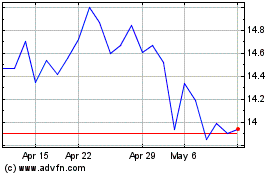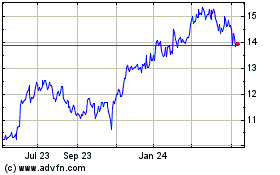Danske Bank Compliance Chief Steps Down Amid Scandal -- Update
July 11 2018 - 6:12PM
Dow Jones News
By Samuel Rubenfeld
The head of compliance for Danske Bank is resigning as the
Denmark's largest bank continues to confront a money-laundering
scandal in Estonia.
Danske Bank launched an internal investigation last year
following reports in Danish media alleging that its Estonian branch
was used to launder money from 2007 to 2015. The bank on Wednesday
said it expects to complete the investigation in September.
Management at the bank also said on Wednesday it was aware for a
while of Anders Meinert Jørgensen's plans to step down as
compliance chief and expects to replace him soon. "For a while now
I have thought about doing something else -- possibly not even in
the financial sector, " Mr. Jørgensen said.
He has led the compliance group at the bank since 2014, and Mr.
Jørgensen said the resignation is unrelated to the money-laundering
scandal.
Danske Bank has declined to comment on the specifics of the
money-laundering allegations until the investigation concludes. It
has, however, found there were insufficient controls to prevent
money laundering at the Estonian branch, and has acknowledged that
foreigners took advantage of the lack of controls, potentially
using the bank for money-laundering purposes.
"Only the authorities can decide whether money laundering did in
fact take place," the bank said on its website.
Danske Bank also faces other accusations concerning potential
money laundering through its Estonian branch.
Hedge-fund manager Bill Browder has alleged that Russians have
laundered more than $8 billion through the bank, and said he plans
to submit his findings to Danish authorities. Mr. Browder has said
the laundered money was connected to a tax fraud discovered by his
attorney, Sergei Magnitsky, who died in Russian custody after
authorities there accused him of carrying out the fraud.
"I would expect there to be legal consequences, not just career
consequences, for those who either played a role in the money
laundering that led to the murder of Sergei Magnitsky, or turned a
blind eye to allow it to happen," said Mr. Browder in an interview
on Wednesday.
A Danske Bank spokesman declined to respond to Mr. Browder's
comments.
The bank has known about the issues surrounding its Estonian
branch for years, according to a timeline posted on its website.
The bank received an email in December 2013 from an internal
whistleblower who pointed to a lack of controls at the Estonian
branch. The bank's internal audit department initiated a probe in
February 2014, and within two months determined that the controls
at the branch were lacking. It shut down its "nonresident
portfolio" at the Estonian branch by 2015, but widened its probes
last year following the media reports.
The bank was reprimanded in May by Danish regulatory
authorities, who said there were serious deficiencies in its
governance and it acted too late on the information concerning the
lack of anti-money-laundering measures.
"On the basis of the knowledge we have today about the extent of
suspicious activities, it is clear than we should have acted faster
and more forcefully. Among other things, we should back then have
launched a thorough investigation into the activities in that
portfolio," the bank has said.
Write to Samuel Rubenfeld at samuel.rubenfeld@wsj.com
(END) Dow Jones Newswires
July 11, 2018 17:57 ET (21:57 GMT)
Copyright (c) 2018 Dow Jones & Company, Inc.
Danske Bank AVS (PK) (USOTC:DNKEY)
Historical Stock Chart
From Mar 2024 to Apr 2024

Danske Bank AVS (PK) (USOTC:DNKEY)
Historical Stock Chart
From Apr 2023 to Apr 2024
